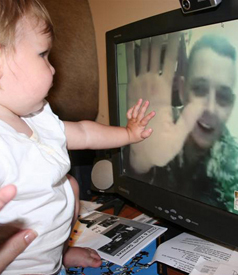In honor of Veterans Day.
Veterans Day is a time to honor those who have served our country. For clinicians at Children’s Hospital Boston, it’s also a time to think about the children whose parents are away from home, serving their country. What does having a parent at war mean for a child? We talked to Children’s psychiatrist Stuart Goldman, MD, about how to help a child cope with this stressful time.
What impact does having a parent away at war have on a child?
In general, it is very hard for children when a parent is deployed. It has two broad effects. The first is that the child is actually missing a parent. Mom or dad isn’t there to tuck them in at night, to make dinner, help with homework or go to a ballet recital. They have to deal with fact that a parent is in a place where they don’t have the same amount of access to them anymore.
It was common in the military’s past to have a parent deployed for long period of time without being able to take their family with them. The difference is that with a deployment to war, children have the realistic fear that something horrendous may happen to their parent. This may be constantly on their mind.
How does the media affect the way a child views the situation?
The media are bombarding children with images of suicide bombers, Humvees with IEDs and it’s hard for children to escape the images of their parents in danger.
How might a child cope with the stress of the possibility of losing a parent to war?
When a situation is overwhelming for children, they may be able to build a defensive cocoon. That way, what’s stressing them out isn’t constantly flooding them. For example, kids that live in rough neighborhoods don’t walk around every day thinking that they could be hurt or even get shot at any minute. This, at times, defensive framework is being challenged by the bombardment of images from the media and may not hold up.
More often children, stressed will show active signs of their distress. They may be clingy, regress to younger behaviors, become surely or irritable or even depressed. Their school work may fall off and their may be behavioral problems. Each of these, if they persist, is a sign that the problem may need the attention of a professional and should be brought up with the child’s pediatrician.
What can be done to help a child deal with the stress?
I think the way to help children is to discuss the situation when the opportunity presents itself. Starting at age 6 or 7, you can ask children what they have heard about the war, or what they’ve been thinking about lately. Follow your questions with silence. Give the child a chance to think through their emotions and to answer honestly. All too often, parents jump to reassure their child without giving them a fair chance to speak.
Parents who are at home with a child while their spouse is at war needs to metabolize the situation on their own first before they can help their kid. Reassure your children that the soldiers are well trained, they know what they’re doing, are doing all that any one can do to stay safe and will come home as soon as possible. Express to children that their parents know how to do their job as safely and carefully as possible.
How can you help a child feel like they have an active role in their parent’s life while they are deployed?
No one wants to feel helpless. Help kids to feel connected by writing letters and emails to their parent and participate in video chats. Make sure there are pictures of mom or dad around. Help kids feel empowered by having them write their representatives or the President. Children can make sure that Veterans Day celebrations get noticed at school and ask their classmates to write letters to parents who are deployed. Making a calendar marking off the days until the parent comes home is another good idea. This can all help kids feel less helpless.
Join us in defending the truth before it’s too late
The future of independent journalism is uncertain, and the consequences of losing it are too grave to ignore. To ensure Truthout remains safe, strong, and free, we need to raise $27,000 in the next 24 hours. Every dollar raised goes directly toward the costs of producing news you can trust.
Please give what you can — because by supporting us with a tax-deductible donation, you’re not just preserving a source of news, you’re helping to safeguard what’s left of our democracy.
